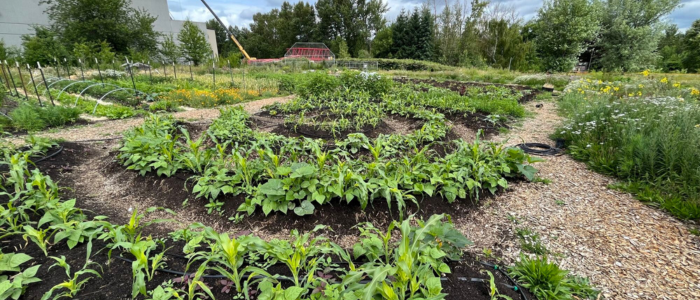Cultivating Native First Foods: Honoring Earth Day Through Indigenous Food Sovereignty
As we celebrate Earth Day this month, we are reminded of the deep connection between Land, food, and community. At the NAYA Family Center, we take this opportunity to reflect on the importance of Indigenous Food Sovereignty and the work we do to cultivate Native First Foods in our garden, Wapas Nah Née Shaku. These original foods, grown and gathered for thousands of years, not only nourish our bodies but also strengthen cultural identity and community resilience.
The Importance of Native First Foods
Native First Foods are the traditional foods of Indigenous Peoples, carefully cultivated and stewarded across generations. These foods, which vary by region and Nation, are deeply intertwined with cultural practices, ecological knowledge, and spiritual traditions. In our garden, Wapas Nah Née Shaku, we grow a variety of First Foods from the Pacific Northwest, including chokecherries, huckleberries, camas, and cous (wild parsley). First Foods from throughout Turtle Island are cultivated to serve the diverse community of Native Peoples in our region. This includes growing Hopi Blue Corn, Tanchi Tohbi (Choctaw white corn), sunchokes, sunflowers, amaranth, epazote, and many traditional varieties of beans, squash, and melons. We also maintain a medicine garden with plants such as sweetgrass, white sage, and milky oats, which support emotional and physical well-being.
By growing these plants, we are actively reclaiming Indigenous food systems and passing down ancestral knowledge. Our garden serves as a living classroom where community members can learn about traditional foods, sustainable harvesting methods, and the significance of these plants in Indigenous cultures. On Earth Day and beyond, we reaffirm our commitment to restoring Native First Foods as a cornerstone of our community’s health and well-being.
Providing Fresh and Traditional Foods to Families
Food sovereignty is not only about growing Native First Foods but also about ensuring access to fresh, culturally relevant, and nutritious foods for all community members. Through our food pantry, we serve hundreds of families each month, offering fresh fruits, vegetables, and traditional foods that align with Indigenous diets. Access to these foods is essential for maintaining health and preventing diet-related illnesses that disproportionately affect Native communities.
Our pantry is more than just a place to receive food—it is a space of dignity and care. We work to source and provide foods that honor Indigenous traditions while meeting the immediate needs of families. By integrating First Foods and fresh produce into our offerings, we are making a tangible impact on food security and fostering a deeper connection to traditional foodways.
Honoring Our Elders with Indigenous Foods
Our commitment to Indigenous Food Sovereignty extends to NAYA’s Elders. Thanks to generous support, we have a dedicated space for Elders to gather, share meals, and access nutritious foods that reflect their cultural heritage. In addition to meals throughout the week and exercise classes, we have established a special pantry stocked with Indigenous foods specifically for our Elders.
This initiative recognizes the importance of providing Elders with foods that are not only nourishing but also familiar and comforting. Access to traditional foods helps maintain a strong connection to culture, supports overall health, and ensures that Elders continue to enjoy the foods that have sustained their ancestors for generations.
Celebrating Earth Day and Indigenous Food Sovereignty
On this Earth Day, we celebrate the resilience of Indigenous food systems and the power of community-led initiatives in reclaiming Native First Foods. By growing traditional plants, providing fresh and culturally relevant foods, and honoring our Elders through specialized food programs, we are strengthening Indigenous Food Sovereignty and creating a future where all community members have access to the nourishment they deserve.
We invite you to join us in this journey—whether by volunteering in the garden, supporting our efforts with a monetary donation, or simply learning more about the significance of Native First Foods. Together, we can honor the Land, our ancestors, and future generations by cultivating a food system rooted in sustainability, respect, and tradition.
